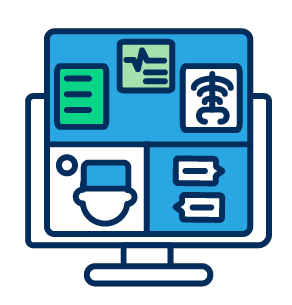Telehealth
Access to care through a hybrid care model, in the office and from home
The increased utilization of telehealth during the COVID-19 pandemic highlighted a critical and beneficial pathway to care for patients and families, particularly those navigating the challenges of rare epilepsy disorders. Today, remote access to healthcare providers continues to play a valuable role in patients’ overall healthcare within the framework of a hybrid care model.
What is telehealth?
Telehealth – or telemedicine – uses audio and/or video to securely connect patients and caregivers, including those living with a rare epilepsy disorder, with a healthcare provider from the comfort of their own home. Accessing care virtually can complement office appointments and enable timely connection between doctors and patients when an in-person visit is not required.
Benefits of Telehealth
The remote nature of telehealth can allow for more convenient, frequent, and broad access to specialized care for rare epilepsy patients.

ConveniencE OF AT-HOME CARE
Avoid the need to travel for appointments, decrease time away from work or school, and reduce exposure to unnecessary health risks.
- Many patients with rare epilepsies have mobility issues, further increasing challenges associated with attending in-person appointments.

increased access to specialists
Enhance opportunities to confirm or explore a diagnosis, modify a treatment plan, and learn about clinical trials and advancements in a specific disease state.
- Potential opportunity to connect with experts specializing in rare epilepsy disorders who may not live within driving distance.

Continuity of care
Allow for more frequent routine and acute care visits while enabling healthcare providers to obtain a more informed assessment of a patient in their preferred environment.
- Additional visits combined with observation of a patient in their home allows for greater insight to personality and behavior, which can inform a more tailored treatment plan.
Learn about one family’s experience with telehealth:
We’ve had between 10 and 12 telehealth appointments with different specialists every year since 2019. You can imagine how important it is to keep my daughter safe and healthy without any infections. Getting telehealth appointments where the physician could see how she is has been a blessing to me and our family.
– Purnima, mother to Riona, living with TSC
Our Commitment
If you would like to incorporate telehealth into your overall healthcare plan, talk to your provider about your options or refer to the resources below.
Telehealth Resources
There are numerous resources available to support your use of telehealth, including technical support, information on best practices, and access to digital technology for your telehealth meetings.
The following content may not be associated with Marinus Pharmaceuticals. Links to all outside sites are provided as a reference for our visitors. Marinus does not endorse and is not responsible for the content on sites that are not owned and operated by Marinus.
- Child Neurology Foundation (CNF) Telehealth
- CNF’s Digital Access Program
- American Epilepsy Society (AES) Telehealth Quick Guide for Providers
- National Library of Medicine Telehealth for Patients with Rare Epilepsies
This list of resources is intended as a sampling of available resources and is not an endorsement or recommendation by Marinus.
